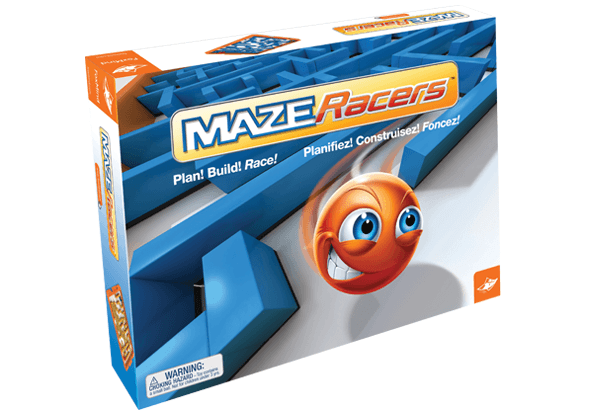The $5,000 Cereal Box Maze: How I Licensed My Simple Game Idea

I consider myself an “accidental inventor.” I’ve been a tinkerer all my life, and lately I had been creating family games, but I never considered myself an inventor. Not until those unforgettable three months in early 2014 when I won BigLeap’s “Games that Make Us Smarter” challenge, and went on to sign a license agreement for a game with FoxMind.
It all began with the BigLeap.org challenge to design low cost educational games for kids. I had been making wooden marble maze game sets, where players race one another to complete a maze. I took this game concept and entered a game called ‘Mazing Race’ (described on this wiki page). In a nutshell, kids glue cut-up straws to create their own maze in a cut-out cereal box. When their maze is complete, they swap it with another team, drop in a marble, and race. You can see a video here.
To my jaw-dropping amazement, I received an email a month later, stating I was the first place winner! I was absolutely stunned. My simple game idea took top honors and $5000! I had an extra spring in my step for a few days, as my kids called me “The Five Thousand Dollar Father.”
The contest was judged by experts in childhood learning and a renowned game inventor, so I knew I had something special with this game concept. This validation gave me the confidence to create a marketable version of the game – a whiteboard and magnetic moveable maze walls. Armed with the winning press release I began to contact toy companies to see if they had any interest in such a game.
Within a month I had three prototypes out, and two months later I had a signed license agreement with FoxMind. They even invited me to join them at the 2015 New York Toy Fair where they showed a prototype of the game. Maze Racers is now available for sale.
I had tried to license a lawn game a year prior (with no success) so I had done some reading on licensing and patents. It was all so confusing as I stumbled my way through a provisional patent and signing an NDA with Wham-O, but in the end I could not find any interested parties for my lawn game. However, with that limited experience under my belt, I continued researching and also contacted industry experts to ask for advice. I wanted to better understand what I was up against and what would help me succeed this time around.
The biggest take away for me this second time was that in the toy industry, NDA’s and patents are not very common, particularly for amateur inventors. This was a bit scary at first, but it really was quite liberating when you could openly share your ideas with other professionals in confidence. I’m sure there are horror stories out there about ideas being stolen, but there must be countless other success stories out there that never get retold. Hopefully the story of the $5000 Cereal Box will be retold!
Below is a summary of the steps that worked for me in my pursuit of a license agreement (without a patent, NDA, agent, or lawyer):
- Have a spectacular game.
- Create a presentation and/or video of your game.
- Identify toy companies and contacts.
- Submit a short description of your game to see if there is interest.
- Send the presentation and/or video to interested companies.
- Send a prototype when requested.
- Follow up and wait for feedback.
- Review and sign a license agreement!
For more information please visit www.CerealBoxMaze.com.





thank you for sharing